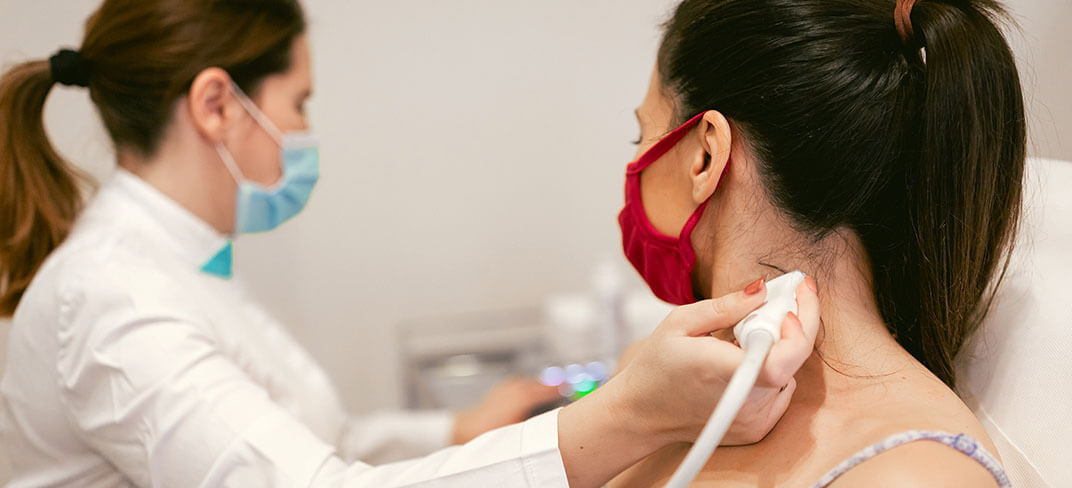
Thyroid: Diagnosis and Treatment
If you suffer from a thyroid disorder, at UPMC you can undergo diagnostic examinations and highly specialized therapeutic and surgical treatments.
Thyroid diseases occur more frequently in women – but the symptoms that appear in men should not be underestimated either. For example, hair loss, impotence, decreased libido, and weight gain could be signs of thyroid disease in men.
It often happens, in fact, that thyroid diseases are not detected promptly because the symptoms that characterize them are common to different pathologies. However, if not recognized and properly treated, benign thyroid pathologies can lead to acute or chronic clinical pictures. Malignant tumors, on the other hand, which are often asymptomatic and are therefore neglected by the patient, present serious risks to the health of the person.
Book an Appointment
You can book services for the diagnosis and treatment of thyroid diseases at the following facilities:
What is the Thyroid?
The thyroid is an endocrine gland that is located at the base of the neck, in the front. Its main function is to produce hormones containing iodine. Through the blood, these then reach all the organs, which they affect the functioning. When the amount of hormones circulating in the body is sufficient, the thyroid stops producing them and then starts again when their level drops.
Iodine is an essential element in the production of these hormones, and its deficiency determines the malfunction of the gland. In particular, thyroid hormones play a fundamental role in the regulation of metabolic functions. It is therefore important that, in our diet, iodine is present in adequate quantities.
Specialist Visits and UPMC Services
At UPMC, you can undergo a variety of visits and specialist examinations in the following areas of clinical activity:
Clinical-diagnostic area:
- Endocrinological examination.
- Blood chemistry tests and hormonal dosages.
- Thyroid ultrasound with color-doppler.
- Needle aspiration.
- Cytology.
Surgical area:
- Surgical evaluation.
- Traditional surgery.
- Video-laparoscopic surgery.
Pathologies Treated
Our doctors deal with thyroid disorders on a daily basis. Among the diagnoses they treat most frequently are:
- Hyperthyroidism. Caused by an excess of thyroid hormones, then an increase in metabolic activity. It can provoke a number of ailments and problems including weight loss, fatigue, insomnia, nervousness, and tachycardia. If it has autoimmune causes, Graves' disease may arise, which has symptomatology similar to that of hyperthyroidism.
- Hypothyroidism. It is one of the most widespread endocrine diseases and is caused by the reduced production of thyroid hormones or their non-use. It involves a reduction in metabolic activity and fluid retention, fatigue, drowsiness, constipation, a sense of swelling, an anxious-depressive state, insomnia, and weight gain (in 57% of cases). It can also lead to a reduction in libido and poor tolerance to cold, and, in women, to the alteration of the menstrual cycle. And symptoms are often associated with memory disorders, difficulty concentrating, and slowed thinking, resulting in poor academic or work performance.
At UPMC, our specialists also cover:
- Thyroiditis in acute (suppurative), subacute (De Quervain's thyroiditis), chronic (Riedel's thyroiditis), and autoimmune (Hashimoto's thyroiditis).
- Morphological alterations (nodular and non-nodular goiters).
- Benign and malignant tumors (papillary, follicular, undifferentiated carcinoma).

We offer medical services and services on a private basis or in agreement with the main insurance companies. Some of our services are also affiliated with the National Health System.
For more information on active agreements, visit:
